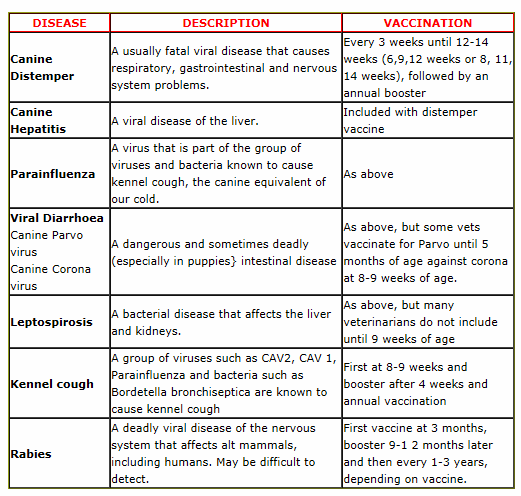Timely Dog Vaccinations for puppies guarantee protection against deadly diseases that your pet dog may otherwise be vulnerable to. It is important for the pet owner to know about two broad categories of the dog vaccines namely- Core vaccines and Non-Core vaccines that together not only offer protection to the canine companion but also indirectly to its human family; as the pet may transmit a disease to its two legged companions.
Comprehensive approach to understanding vaccination
Vaccines are crucial to maintain a healthy and lengthy pet existence. They build a healthy immune system by introducing antigens in the pet’s body. Antigens resemble the disease causative agents such as a virus, bacterium or fungus etc and stimulate the production of anti-bodies. Therefore any future attack by a real disease is effectively tackled by the pet’s immune system.
- Core vaccines: Extremely crucial to all dogs, include, Rabies vaccine, Parvovirus, adenovirus, Distemper and Canine hepatitis.
- Non-Core vaccines: Administered only in certain cases depending upon the pet’s contact with kennels, shelter homes, certain areas or neighborhood (exposed to a disease) where the pet may visit or reside and interaction with another pet/animal infected with the disease. These include, Coronavirus, Leptospirosis, Bordetella bronchiseptica, and Canine parainfluenza. Consulting the vet becomes important as he/she will look into the environmental factors as well as your dog’s breed, age and health condition before deeming these vaccines necessary for the pet.
Risks/Side effects associated with vaccination: Swelling and soreness is experienced at the spot where the shot is given, sometimes there is also loss of hair around the injection point. Other side effects may include- Fever, Lethargy, Nausea, Diarrhea, Decreased appetite, swelling of the face, Seizures, Unconsciousness, Breathing problems, and Limping. However, most canines will not show any such adverse reactions to vaccines. Vaccination is more like a lifeline for the pet to escape infections and combat diseases. A mild side effect usually subsides in a short time, however if the pet shows an extended reaction then it is best to involve the vet immediately.
Appropriate Vaccination schedule:
Puppy vaccination procedure usually begins at the age of five to six weeks; especially if the mother is inoculated else it may begin at four weeks. A mother’s milk is enriched with the requisite anti-bodies that take care of the pup in its initial days. However after the first couple of weeks de-worming the puppy is important to free it of hook worms that attach to the gut-wall and round worms that infest the intestines.
The first inoculation schedule carried out at six weeks includes the Parvovirus and Distemper vaccines. A booster shot of the same is administered at 7 to 8 weeks of age to boost immunity against the disease causing antigens and revive the fading immunity.
Between 8 to 9 weeks a combination vaccine is given to the pet dog that includes Parvovirus, Leptospirosis, Adenovirus & hepatitis, Parainfluenza, Bordetella, and Coronavirus.
At 10 to 12 weeks the puppy again needs to be de-wormed. Also an anti-rabies vaccination is given at about 12 weeks of age.
At 12 to 15 weeks a combination vaccine is injected. Non-core vaccines may be included into this depending upon exposure due to travelling or otherwise to a certain disease.
Between 15 – 16 weeks a booster dose for Rabies is to be given, followed by annual booster shots of Rabies vaccine (or a time interval dictated by the state/local law)
De-worming of the pet must take place every three to four months.
Following the first year the core vaccines need to be given either annually or after every three years as governed by the animal doctor.
Your vet will guide you through an appropriate inoculation chart that will be based upon the dog’s everyday life, well being, age and regularity in terms of travelling to different areas/cities within the country. Therefore some non-core vaccines may be required by your dog that can be determined by the veterinarian along with their time frame.
Apart from following a vaccination schedule, an annual check-up helps a great deal in timely diagnosing an illness and treating it. Also, Titer-tests are available and prove highly beneficial in determining the collection of anti-bodies that combat a certain disease/infection in the blood circulating throughout the dog’s body. This encourages vaccinating in a controlled manner and only when necessary once the knowledge of the duration of immunity to an illness is achieved through the Titer blood test.
Resource box:
http://www.peteducation.com/article.cfm?c=2+2115&aid=950
http://www.aspca.org/pet-care/general-pet-care/vaccinations-your-pet
http://dogtime.com/dog-health/general/1199-vaccination-tips-aaha


